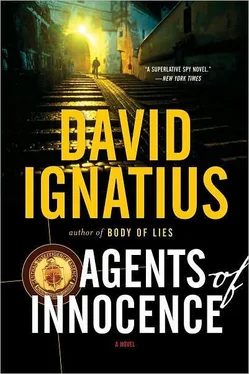David Ignatius - Agents of Innocence
Здесь есть возможность читать онлайн «David Ignatius - Agents of Innocence» весь текст электронной книги совершенно бесплатно (целиком полную версию без сокращений). В некоторых случаях можно слушать аудио, скачать через торрент в формате fb2 и присутствует краткое содержание. Жанр: Шпионский детектив, на английском языке. Описание произведения, (предисловие) а так же отзывы посетителей доступны на портале библиотеки ЛибКат.
- Название:Agents of Innocence
- Автор:
- Жанр:
- Год:неизвестен
- ISBN:нет данных
- Рейтинг книги:3 / 5. Голосов: 1
-
Избранное:Добавить в избранное
- Отзывы:
-
Ваша оценка:
- 60
- 1
- 2
- 3
- 4
- 5
Agents of Innocence: краткое содержание, описание и аннотация
Предлагаем к чтению аннотацию, описание, краткое содержание или предисловие (зависит от того, что написал сам автор книги «Agents of Innocence»). Если вы не нашли необходимую информацию о книге — напишите в комментариях, мы постараемся отыскать её.
Agents of Innocence — читать онлайн бесплатно полную книгу (весь текст) целиком
Ниже представлен текст книги, разбитый по страницам. Система сохранения места последней прочитанной страницы, позволяет с удобством читать онлайн бесплатно книгу «Agents of Innocence», без необходимости каждый раз заново искать на чём Вы остановились. Поставьте закладку, и сможете в любой момент перейти на страницу, на которой закончили чтение.
Интервал:
Закладка:
Levi serviced the first Damascus drop the next morning. He went to the agricultural exhibit at the Damascus trade fair. The agent, he had been told, was a Sunni professor of agronomy at the University of Damascus whose father had been killed by the Alawites. His chosen revenge was to provide documents about Syrian efforts to monitor Israeli communications.
Levi chatted casually with a member of the staff at the agricultural exhibit. On the exhibit table, right where it should be, was a prospectus on new techniques in chicken farming. He picked it up and turned the pages slowly until he felt a small envelope. When he was confident that nobody was looking, Levi slipped the envelope in his pocket. It was so easy, so simple.
The final pick-up was scheduled for the next morning. Levi spent the rest of the day touring the city. Perhaps he would make it back home after all.
When Levi returned to his hotel that night, he had a fright. Someone had gone through his things. Not just the maid, but a professional. He had left the briefcase closed on the bureau. Someone had opened it and gone through the commercial documents. The signs were obvious: the papers weren’t aligned the same way he had left them, and the piece of hair he had left on the top page of the agricultural contract was gone. Levi’s heart was pounding. His forehead was sweating. He went into the bathroom and looked at his face in the mirror. What he saw was fear.
So what, he told himself. So they have looked at my papers. So much the better. They confirm that I am in the import-export business and have travelled to Syria to sign a contract. They will call the tomato farmer who gave me lunch, and he will confirm my alibi. They will call the hotel in Aleppo and they will confirm my alibi. So why am I worried? They haven’t found the false bottom of the briefcase and there is no other evidence-none-that I am anything other than a French businessman.
Levi picked up the phone and heard a hollow sound, as if something was drawing just a bit of power off the line. They are watching me, Levi told himself. Somehow, they know. I am a dead man.
The last drop was in the Damascus souk. Levi didn’t want to get out of bed the next morning. He wanted to stay, to hide under the covers, to call in sick. But he got up, motivated as much by hatred of his work and a desire to be done with it as by anything else. He dressed and went to the souk. It was natural, he told himself. The last day in Damascus, any visitor would go to the souk. He didn’t notice any surveillance on the way, but he didn’t find that reassuring. They have put their best team on me, he thought.
The souk was a vast stockyard of merchandise. Hundreds of merchants did their business in rows of steel-roofed sheds, selling a profusion of wares and trinkets. There were men selling fine linen for ladies, checkered kaffiyehs for the men, hammered brass, exotic birds, ill-fitting suits from Czechoslovakia, cheap shoes from Egypt that proclaimed on the insole: “All Lether,” house plants, garden plants, tiles, fake papyrus documents, real papyrus documents, mirrors with the name of Allah written in script on the glass, prayer rugs with a compass built into the rug so that the pilgrim would never be confused about the direction of Mecca. Levi had studied the hand-drawn maps of the souk so many times before he left Beirut that he felt he knew the location of every brick-a-brac merchant in this vast square mile of commerce.
His instructions were to go to a particular stall in a particular shed, where there was a merchant who sold fine wooden boxes, inlaid with mother-of-pearl. He shouldn’t go directly there, but browse, amble, watch his tail. When he reached the particular stall, he should admire the merchant’s work and ask to see his finer boxes, which were usually kept inside the shop. Levi should browse until he found a particular box, with a design on the top in the shape of an elephant. A very unusual box and design. There could not be another one like it in the souk. He should buy the box, take it back to his hotel, and remove the intelligence that was hidden inside.
The merchant himself would know nothing about Levi, who he was, what he was doing. So far as the merchant knew, Levi was just another customer. A foreigner, which meant that he would probably pay double what anything was worth. The merchant was the uncle of Levi’s agent. And the agent, Levi understood, was very good indeed. He was a Palestinian who worked with one of the radical factions that were headquartered in Damascus. He was worth the trouble.
Levi approached the stall. The merchant, dressed in dark trousers and pajama tops, gave him a toothless smile.
“Good price, very good price,” said the merchant.
Levi nodded. He picked up some of the cheaper boxes and returned them to the rack.
“Les grandes boites?” he asked in French. Then he tried English. “Where are the big ones?”
The merchant smiled. Here was a discerning customer. He escorted Levi inside. Levi glanced at the passageway to see if anyone was watching. Several other merchants were glowering at him, but he assumed that was simple avarice and envy. He entered the tiny room, illuminated by a naked bulb. Arrayed against the wall was a profusion of inlaid wooden boxes, perhaps one hundred of them. Levi began his browsing, checking each box for the mark. He saw a tiger, several horses, and a numbing sample of stars, squares, and circles. But no elephant.
Where was it? Levi was starting to sweat. The merchant was nodding and rubbing his hands, waiting for Levi to buy something. Levi looked again quickly through the inventory. He was sure now. The elephant wasn’t there. He looked out the window of the shop. Who was that man in the baggy brown suit? Had he seen him before? Had he been sitting at another exhibit table at the trade fair yesterday? No. Maybe. Levi couldn’t be sure. His head was spinning. He turned apologetically to the merchant.
“Rien. Rien du tout,” said Levi.
The merchant, not understanding French, nodded and smiled.
“Good price, very good price,” said the merchant.
By that time Levi was out the door.
The agony came when Levi was finally out of the souk, sitting in a cafe, with time to consider what had happened. The box hadn’t been there. The agent hadn’t been able to deliver it. Why not? Had he been caught? Was he being followed? Or was he just late delivering it. Or had he forgotten the day? Levi felt sick. He tried to eat a sandwich but couldn’t. All he wanted to do was smoke cigarettes. And get caught, and have it done with, rather than continue the cheap drama that was eating his stomach out.
The instructions were very clear about what Levi should do if he missed the drop on the appointed day. He should wait a day and try again.
For Levi, it was the additional waiting that was excruciating. We can all be brave when we have no other choice. In those brief moments when heroism is required in extreme circumstances, it is usually present. When a soldier is actually under fire, his nerves become calm. He follows orders. The agony is in the waiting. Thinking, dreading, fraying the nerves to the point that they are too thin to bear the load.
Maybe we can do it once, the thing that scares us. Perhaps we can summon enough courage to do one time the thing that terrifies us, gritting our teeth, closing our eyes. But twice is impossible. To go back a second time, after we have stretched our nerves so taut we fear they will snap, that is beyond all but the fearless, whose nerves are dead.
And yet there was Levi the next morning, rising hollow-eyed after a sleepless night, going back to do it a second time. Praying now that it would end soon. Holding his cyanide tablet in his clenched palm like a sacrament.
Everyone seemed to be looking at Levi curiously the next morning. He told the man at the front desk he would be staying another day. More shopping. The man arched his eyebrows. Nobody stays in Syria an extra day unless they have to, the look seemed to say. What a fine souk you have here in Damascus, Levi told the desk clerk. I think I’ll go back.
Читать дальшеИнтервал:
Закладка:
Похожие книги на «Agents of Innocence»
Представляем Вашему вниманию похожие книги на «Agents of Innocence» списком для выбора. Мы отобрали схожую по названию и смыслу литературу в надежде предоставить читателям больше вариантов отыскать новые, интересные, ещё непрочитанные произведения.
Обсуждение, отзывы о книге «Agents of Innocence» и просто собственные мнения читателей. Оставьте ваши комментарии, напишите, что Вы думаете о произведении, его смысле или главных героях. Укажите что конкретно понравилось, а что нет, и почему Вы так считаете.












